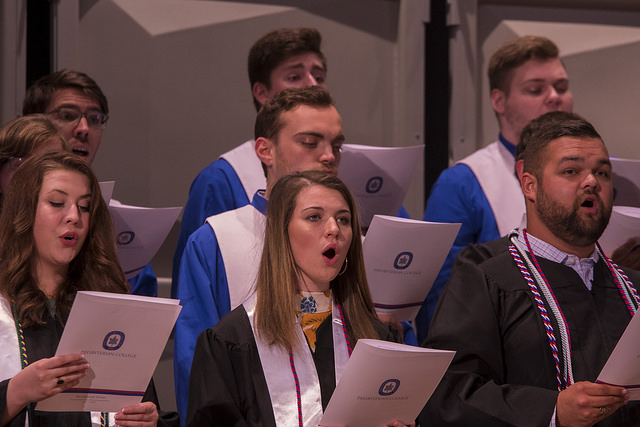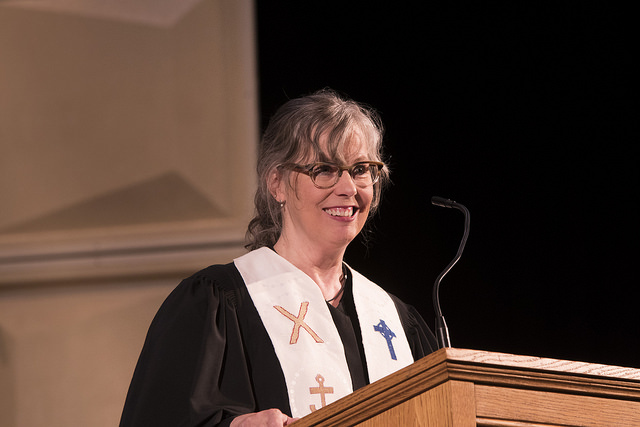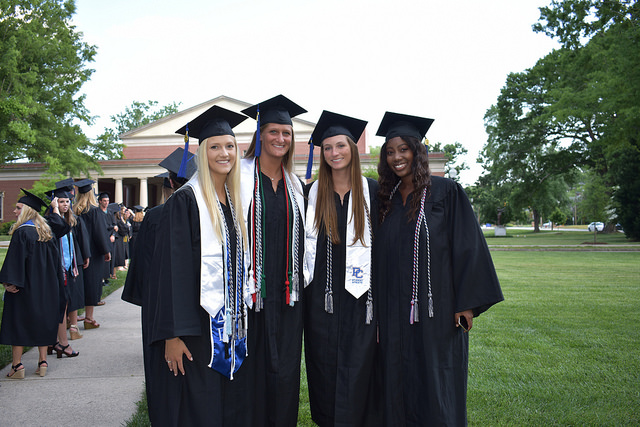Graduates Consider What’s Next during Baccalaureate

The Baccalaureate Service for the 135th Commencement began at 6 p.m. on Friday, May 11. The historic event was held in Belk Auditorium.
“While this is an end to one phase of your life, it is also the beginning of a new and important phase of your life,” President Bob Staton told the graduating class.
“It is our hope that this occasion will be a springboard to inspiring lives for each graduate. Lives that reflect values nurtured and grown during your years at PC and inspired by our motto, ‘While we live, we serve.’”
Provost Dr. Donald Raber led the congregation in a Call to Worship before joining in the hymn “Come and Seek the Ways of Wisdom.” Barksdale Professor of Music Dr. Porter Stokes then led the Presbyterian College Choir in the anthem “Jubilate Deo” in his last Baccalaureate Service before retiring.
After President Staton offered the Prayer of the Day, two graduating seniors delivered this year’s lessons from the Old and New Testaments. Julia Law read Psalm 133, and Jacob Kennedy read Acts 4:32-35.

Baccalaureate Sermon
Dr. Anna Carter Florence, the Peter Marshall Professor of Preaching at Columbia Theological Seminary, delivered the 2018 Baccalaureate Sermon. Florence read from John 20:19-31 to show graduates how Thomas’ situation was similar to theirs.
“I wish I could tell you they had it all set, with diplomas and job offers and reasonably-priced one-bedroom apartments in Jerusalem; but they didn’t,” Florence said. “I wish I could tell you that they were ready to Go ye into all the world!—boldly, keenly, confidently, decisively; but they weren’t. No, they were frightened, confused, besieged, and second-guessing. They were huddled together in a locked room on an upper floor, scared out of their minds.”
Jesus was gone, and the disciples were huddled together in a locked room. They were talking about what to do next when Jesus appeared.
“It isn’t exactly a game plan for what’s next—a diploma, a job offer, an apartment with roommates—but it’s a promise that he’s still with them and everything has changed,” Florence said.
“Death doesn’t have the last word. The crucifixion was not the end. Life has a purpose, and it has to do with being sent into the world: ‘While we live, we serve,’ as your college motto puts it.
‘As the Father has sent me, so I send you,’ Jesus tells them, and it might as well be their graduation ceremony. Tomorrow, it’s a new world. And even if they don’t quite know yet, what it will look like, they know that world is here, and they’re stepping into it. With, as it turns out, everything they need to do it.”
Florence goes on to discuss Thomas, the only disciple absent when Jesus appeared in the locked room. According to Florence, this “does present an equal opportunity challenge.”
“When resurrection happens, when new life beyond anything we expected happens, and when some of us are eyewitnesses and others aren’t, how do we talk to one another?” Florence asked. “How do you tell your friend who missed it, this time, that there’s still hope—more of it than we ever thought? How do you tell your friend who was in the room and did witness it, this time around, that her certainty about what’s next is awesome, but you’re just not there, yet, and you need more, from God and maybe from her?”
According to Florence, the Easter stories provide “space for Jesus’ disciples and followers to practice the gift of seeing what God is doing among us as well as the gift of not being the ones who see, in quite that way. The gift of believing with utter certainty and the gift of needing more encounters before you can.”
Florence says that those who miss out on an event often refuse to believe it. She said we change the subject from “God to ourselves, and that is never helpful.”
“You can’t take it personally, when you’re the one who wasn’t there,” Florence said. “You have to have some imaginative maturity, to remember that this is not about us. This is about what God is doing to reconcile our broken world.”
Thomas learned “what we all learn, over and over, because we never get a complete handle on it,” Florence said.
“The question of what’s next is never a question of which we are the subject. God is the subject. ‘What’s next’ is what God is doing in this world, and how we’re going to be a part of it. And we never have all the answers laid out in front of us.”
Florence is an ordained minister in the Presbyterian Church (USA) and holds degrees from Yale University and Princeton Theological Seminary (M.Div. and Ph.D.). Before joining the Columbia faculty in 1998, Florence served as an associate pastor for youth and young adults at Westminster Presbyterian Church in Minneapolis. Her books include Preaching as Testimony, Inscribing the Word, and Rehearsing Scripture: Discovering God’s Word in Community, based on her 2012 Lyman Beecher Lectures on Preaching at Yale Divinity School. Her current book project is ‘A’ is for Alabaster: A Preacher’s Alphabet.
Florence has published numerous articles and chapters in books and journals, including a year’s worth of lectionary text commentaries for www.WorkingPreacher.com. Florence’s research focuses on testimony, preaching pedagogies, and creative strategies for communities to engage and encounter the biblical text. She is a frequent teacher and lecturer in the U.S. and abroad.

The End of the Service
Staton led the recitation of the Apostles’ Creed after Florence’s sermon. The Rev. Rachel Parsons-Wells ‘02, director of religious life and services, offered the Prayers of the People.
Raber led the 2018 graduating seniors in the Service of Investiture, which ends with “send us forth to serve thee and our neighbors.” After Wells-Parsons read the benediction, the PC Choir sang “Nunc Dimittis,” Latin for “Now you dismiss.”
